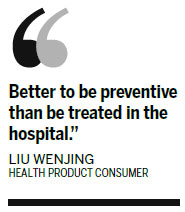Nutritional supplements a thriving market
Updated: 2014-10-02 07:34
By Wang Zhuoqiong(China Daily USA)
|
||||||||
Survey shows that wellness is a growing concern for consumers
Fifty-six year-old Liu Wen-jing developed a new hobby after she retired-taking nutritional products twice a day to alleviate high cholesterol and knee pain.
"Better to be preventive than be treated in the hospital," said Liu, who is among a rising number of Chinese consumers who are concerned about their health.
|
A glossy ganoderma with a diameter of 1.2 meters is displayed at the 4th International Health Maintenance Expo, held last October in Wuyi county, Zhejiang province. Zhang Jiancheng / For China Daily |
|
An exhibitor from Taiwan displays nutritional products at the 13th International Nutrition and Health Industry Expo held in Beijing last November. Provided to China Daily |
According to a health and wellness survey conducted by the Boston Consulting Group in 2013, 73 percent of Chinese consumers are willing to trade up and pay a higher price for products that are deemed healthier.
That is 12 percentage points higher than the global average.
Besides aspiring to physical health and wellness, Chinese people also want to be happy, look good and have enough energy for an active lifestyle, the survey indicated.
Last year, health care and nutrition products jumped to second out of 15 product categories in which Chinese consumers planned to spend more, up from No 11 in 2011, said the survey, which interviewed 2,600 Chinese consumers from the middle and affluent classes.
Rising income levels among those classes are driving the market shift. Earning an annual income of 120,000 yuan and crossing the threshold of the low-affluent class is the inflection point for increased consumption of vitamins and supplements, the report said.
The report projected solid growth for the OTC (over the counter) segment and even stronger growth for the VMS (vitamins, minerals and supplements) market.
From 2012 to 2020, it is estimated that the OTC segment will grow by 8 percent annually, and the VMS market is expected to grow even faster, at 13 percent, according to the report. China's retail health market is predicted to more than double the current estimated value of $67 billion.
The reasons behind rising interest in health and nutrition products are said to be needs-based. The BCG report found that almost half of Chinese consumers surveyed reported feeling subpar because of lifestyle factors such as work pressure, family obligations and long work hours, generating physical complaints ranging from insomnia and fatigue to obesity and frequent illness.
The report said the incidence of these complaints is growing, especially among younger people, with 30 percent of respondents aged 18 to 24 reporting ailments compared with only 18 percent of those over 40 years old.
Chinese consumers are looking not only for treatments but also for disease prevention through exercise, diet and nutrition products.

The concept and the use of health and nutrition products are relatively new to the country, and consumers are not always able to interpret the terminology used to describe such products.
Lack of knowledge, combined with a lack of stringent regulations and aggressive product marketing, leads to trust issues among Chinese consumers. More than half of those surveyed said they worry that health food products may not be made as advertised. Many take less than the recommended dosage because they fear side efforts or additives.
Given the fragmented Chinese health market, the BCG report suggested companies develop product portfolios by enhancing brand building, since Chinese consumers prefer trusted brands, and educate and inform consumers about their product quality to correct common misconceptions.
It is also important to manage retail outlets aggressively because most consumers make their final purchase decisions at retail stores or pharmacy chains, the report said.
Online opportunity
Christina Wang is a veteran purchaser on Taobao.com, the country's leading online retailer. Nutrition and health products are one of the regular purchases she makes from the stores on the website that offer international brands in this category.
She shops for fish oil and omega-3 supplements for her mother, who has heart health risks, and multivitamins for herself from the online shops.
The Internet is not an important purchasing channel for health and nutrition products yet but it soon will be. According to BCG's survey, the Internet is a critical channel for information and sales in many product categories.
The total number of online shoppers in China grew to 260 million in 2013, up from 180 million in 2011, and online sales already take up about 8 percent of total retail sales, according to the report. But due to trust issues, only 2 percent of consumer health products are purchased online.
Still, the online channel for such products is developing quickly, as the government and industry players work to improve consumers' confidence, including stricter requirements for online vendors and consumer education campaigns released by the various enterprises.
The number of products available also is growing quickly. Take JD.com, one of the country's largest retailers, for example. It now offers more than 4,000 health products online.
The report predicted that the health and wellness market will migrate to the Internet sooner than later, given that the Internet provides more convenience, greater price transparency and more product information than off line shopping.
Online promotions and discounts may also engage consumers and drive sales, especially for known and proven products, the survey said.
wangzhuoqiong@chinadaily.com.cn
(China Daily USA 10/02/2014 page15)
Most Viewed
Editor's Picks

|

|

|

|

|

|
Today's Top News
At least 3 Chinese tourists killed in S. Africa traffic accident
China, US diplomats seek new type of relations
EU says Ireland swapped Apple tax deal for jobs
Netflix to release 'Crouching Tiger' sequel
Chow Tai Fook will remain focused on China
US Secret Service director resigns
Chinese mainland is Hong Kong's future: the Guardian
Up to 18 exposed to US Ebola patient, including children
US Weekly

|

|

















